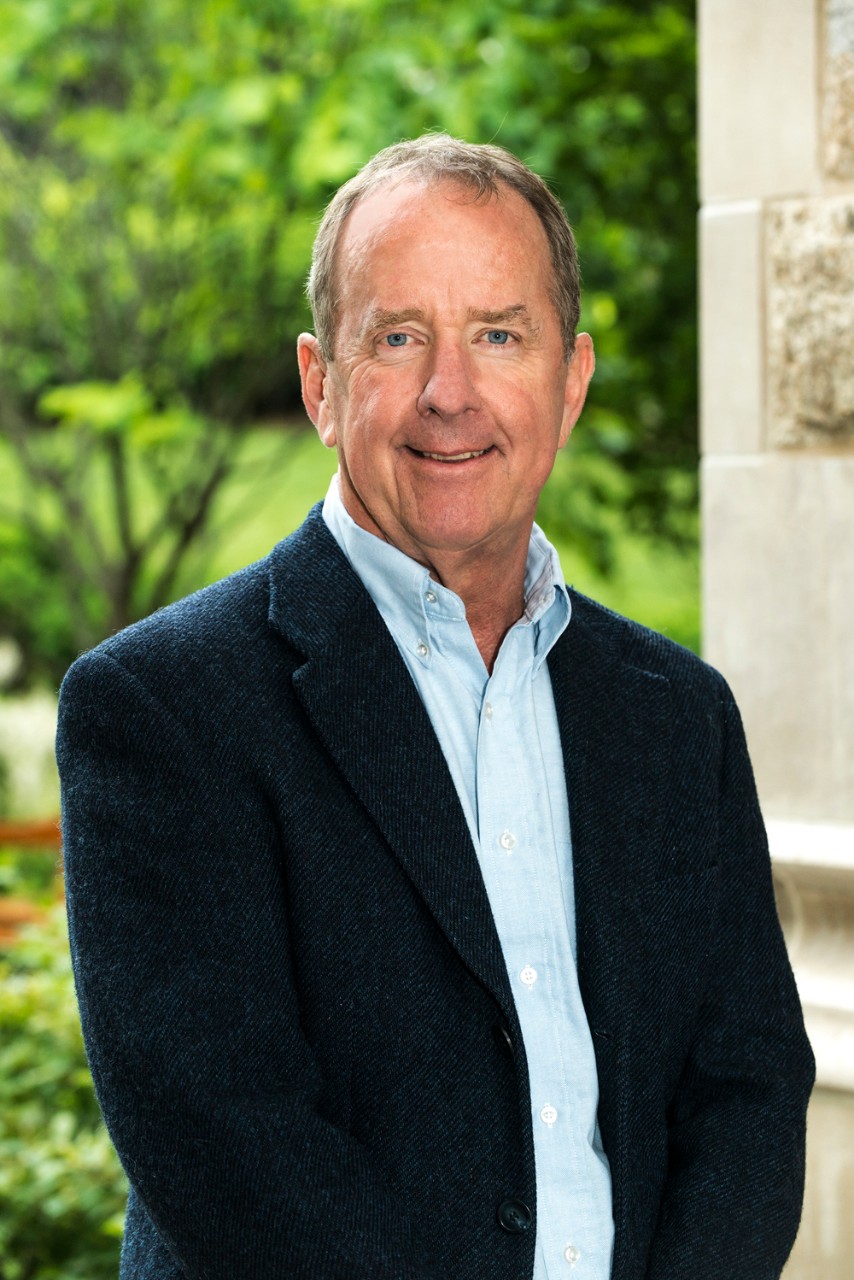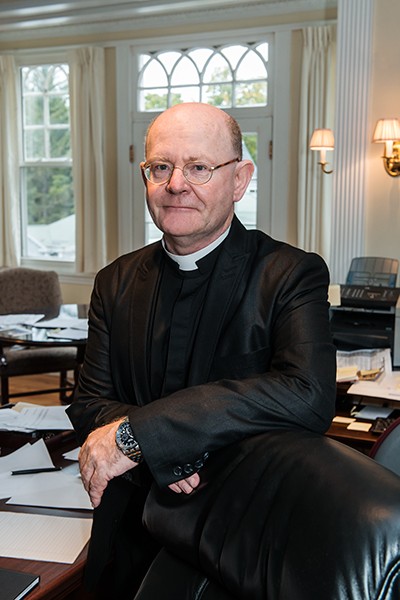Belfast City Hall, above, by William Murphy via Wikimedia Commons. Portraits by Lee Pellegrini.
When Boston College held its Commencement Exercises on May 18, 1998, the occasion was not just a graduation ceremony, but a view of history in the making.
Addressing the Class of 1998 and the Alumni Stadium audience, Irish Prime Minister Bertie Ahern made a public appeal for the recently signed Good Friday Agreement, which within days faced a referendum in both the Irish Republic and Northern Ireland. As Ahern explained, the GFA had halted the three decades of conflict and tragedy in Northern Ireland known as “the Troubles,” offering hope for the troubled region.
“Just as you graduates are starting on a new journey in life,” he said, “we in Ireland are looking forward to our own new beginning. For the first time since 1918, the people of the whole of Ireland will have the opportunity to vote for a common, shared vision of their future together.”
By the end of that week, the GFA had been overwhelmingly ratified, and a new era in Northern Ireland began with the prospect of restoration of self-government with power sharing, a focus on civil and political rights, police reform, and demilitarization.
Twenty-five years later, the GFA and its legacy is the subject of much reflection throughout Northern Ireland and beyond, including among Boston College’s Irish scholars. [The Irish Studies Program will host a two-day conference this month, “Writing the Troubles: A Perspective on the 25th anniversary of the Good Friday Agreement.”] Disappointments and setbacks, some due to unforeseen circumstances and events—notably Brexit—have diluted the hoped-for impact of the agreement, say faculty members. Socially, politically, and economically, Northern Ireland still has a long way to go to shake off the Troubles’ effects.
But does that mean the GFA failed? Not at all, according to the scholars: Above all else, it stopped a bloody civil war that seemed almost impossible to resolve and provided at least a pathway to prosperity and equality.

Robert Savage
“The agreement ended what many considered an unsolvable conflict,” said Robert Savage, professor of the practice in the History Department. “The Troubles witnessed 30 years of bloody mayhem that destroyed the lives of many people. What is most remarkable and should not be overlooked is that the violence has ended.”
“Despite periods of interruption, the GFA has restored devolved government to the country in a dynamic and creative way, so that there is genuine power sharing between people who, prior to 1998, would scarcely speak to one another,” said Professor of History Oliver Rafferty, S.J. Getting to “yes” required bitter foes to put aside longstanding, fervently-held views, he added: Republicans/nationalists who opposed the very existence of Northern Ireland accepted the reality of the state, as well as the police service—a particular source of controversy—and that Northern Ireland’s status “could not be changed without the consent of the unionist majority”; unionists/loyalists “realized that government would have to be shared to a meaningful degree with the Catholic nationalist minority.”
Retired Associate Professor of History Kevin O’Neill, co-founder of BC’s Irish Studies Program, cites the courage of John Hume (a regular visitor and occasional visiting faculty member at BC) as crucial to the GFA. As Northern Ireland’s leading Catholic politician and head of the Social Democratic and Labour Party, Hume was aware “that by creating the new political institutions of the agreement, he was likely consigning his own party to marginalization. But he considered the end of destructive violence worth the risk.”
Boston College proved to be a locus of relevant activity during this transition period in Northern Ireland. In the fall of 1998, the University’s Irish Institute—which for years had offered “cross-border” programs for both Northern Irish and Irish professionals—launched a series of seminars and discussions to help members of the newly created Northern Ireland Assembly prepare for their responsibilities as leaders in government; BC Political Science faculty members Marc Landy, Dennis Hale, and John Tierney were among those involved in the program.
The campus also hosted many of the key figures in the GFA negotiations, including Hume and his co-Nobel Peace Prize recipient David Trimble (both were awarded honorary degrees from BC), Martin McGuinness, David Irvine, Gusty Spence and Mo Mowlam. Hume also helped teach a course with Savage and other BC faculty.
Despite the optimism it generated, said faculty experts, the GFA has had its vulnerabilities, not least in the formulation of the Northern Ireland Assembly, which has endured numerous interruptions and suspensions mainly because of conflicts between the Democratic Unionist Party (DUP) and Sinn Féin, which represents the Irish nationalist community and is now the assembly’s largest party. The assembly has not met in nearly a year, in part because the DUP refused to assent to the election of a Sinn Féin first minister.
Frustrating as it may be that the assembly can be so readily disrupted by one party—and by extension the particular community it represents—O’Neill said that this flaw was actually necessary in achieving the GFA: “Without the ability to boycott or veto,” he explained, “the very real insecurities of the major parties would have prevented the agreement.”
Not to be overlooked, say the faculty members, are the deep wounds in Northern Ireland left from the Troubles, and other scars that go back for generations. Society is still divided, Savage noted, with Catholic children attending Catholic schools and Protestant children going to state schools generally viewed as “Protestant”; many young people, especially from working-class backgrounds, struggle to find decent jobs.
O’Neill pointed to the failure to establish a “truth and reconciliation process” that, among other things, could aid in addressing the legacy of violence.

Oliver Rafferty, S.J.
Meanwhile, according to Fr. Rafferty, Protestant unionists think Catholic nationalists were given an advantageous position from the GFA—a psychological response in part, he added, because the Protestant unionist community for so long assumed it was the dominant one in Northern Irish society.
Then there’s Brexit, note the faculty members: It’s caused difficulties in the relationship between Northern Ireland, Ireland, and Great Britain, and in particular exacerbated the stand-off in the assembly, as the DUP and other unionists criticized efforts by the Irish and British governments, along with the European Union, to resolve the complex Brexit-related customs and immigration issues known as the Northern Ireland Protocol. Within Northern Ireland itself, the majority of voters—including most Catholics and nationalists—opposed Brexit, while unionists felt their connection to the United Kingdom threatened by the EU.
Yet for all the pessimism about post-GFA Northern Ireland, it’s possible to find hope, according to Savage. When he first began working and researching there many years ago, “there were soldiers everywhere, the police traveled in armored cars, and there was a sense of dread in places such as Belfast. That is no longer the case.” While Belfast and Derry still have issues with unemployment, poverty, and segregated neighborhoods, “the cities have come back to life—the Lagan River that runs through Belfast has seen the type of development that brings people, including tourists, back into the city.” The pubs and restaurants are filled with people and music, he added, “a sharp contrast to what they were like even in the 1990s.”
Hume, who died in 2020, gave what might be the definitive summary of the GFA’s raison d’être when he spoke at BC in 1999: “In many ways, we are all victims in this conflict. The best we can do for the dead is to make a new Northern Ireland as a monument for them and to leave the past behind us.”
Sean Smith | University Communications | April 2023




.jpg)